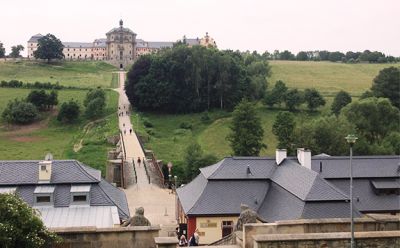“Pharmacy is unique because it both opens a door for students to learn more about the natural sciences and provides the stability of a good career,” says the dean of the Faculty of Pharmacy in Hradec Králové Tomáš Šimůnek. in the following Forum interview, he discusses not only life at the faculty but also vaccines against the coronavirus.
Your faculty received strong marks in an extensive evaluation process that was conducted independently at Charles University that ranked all 17 faculties according to various criteria; how do you feel about the result?
We’re very happy with the way things turned out. At the same time, we are aware we carry an enormous responsibility moving forward. It’s one thing to score highly and another to maintain the same level over time. We want to introduce further improvements and have to evaluate whether steps we are planning will truly move us forward and improve quality, or whether they are only quicker, simplified processes that otherwise don’t bring anything new to the table.
To what do you attribute the recent high marks?
The last few years we worked on improving scientific activities, focusing on quality above quantity, to achieve excellence. We tried to attract the best people, whether new scientific staff or experienced researchers. Professor Frantíšek Švec, who for many years led one of the institutes at the University of Berkeley in California, joined our team and has helped enormously with modernisation and development. It’s important to say that the result is a collective one, involving the work of many, from our academics to our students.
What are the strongest scientific fields at the Faculty of Pharmacy?
We have several flagships. Most definitely among them is pharmaceutical or medicinal chemistry which is Professor Švec’s area of expertise. In these fields we rank among the very best workplaces in the world. Then there is pharmacology, toxicology, biochemistry and other areas where we have achieved success.
The faculty understandably cooperates closely with the pharmaceutical industry: what is that like in practice?
Some of our doctoral students are taking part in the PARC project run by Zentiva. But we also work closely with other pharmaceutical companies, such as the local firm Müller Pharma. We also work with a number of biotechnological companies. I have to say, though, that that is area where we still have room to grow and improve: in short, we need to be even more active.
What are some of the most important things your students learn?
We provide them with a truly complex look into the area of pharmaceuticals or medicines. They gain an understanding of pharmaceuticals from A to Z. Equally important, however, is teaching students to think critically, to be able to properly analyse data, to learn how to learn properly. What was sufficient 20 years ago is not anymore: you can find all kinds of information online, but the hard part is separating what is important from what is not, and to recognise bombast and disinformation. The world is changing rapidly and we try and teach students how to navigate the flood of information out there and maintain their bearings.
Concretely, how do you get them to think critically?
We urge all students but especially the higher-years not just to memorise facts but to focus on solutions for concrete problems. We gently push them to think for themselves and to conduct independent analysis. That’s why more and more classes are seminars where there is greater group discussion. Whether we will be successful also depends a lot on them. As early as enrolment, I tell students that they need to take a pro-active approach. They may get by with what they learn five or 10 years but in the future it might not be enough. It is essential they are active in their field.
Many of your graduates go on to become chemists. What is required to become a good pharmacist and how have the skills that are required changed?
The job has changed quite a lot. Today, communication, interaction with patients, understanding client problems, are needed. That is why soft skills are important. We run a number of courses helping students improve those and some are even organised by the students themselves.
A good pharmacist also has to be able to adapt. There is a customer need for online consultation, as the current pandemic revealed. At the same time, chemists have to retain all of the traditional skills and competencies. Even today, a chemist has to be able to prepare individual medicines that are unavailable ready-made from the factory. So the requirements that out graduates need to meet have gone up. And as I said earlier, what was enough years ago, is not enough today.
Students can practice their communication skills in a practice pharmacy the faculty has…
That is essential for communication and students can see for themselves how to apply knowledge to concrete patients. A client can be upset or confused because they no longer produce a medicine they used to take, or irritated and so on. A chemist has to take it in stride and not be caught off guard. We have a TV studio in the practice pharmacy to film how students reacted, for post-analysis.
That has to be exciting for them. What kind of feedback do you have from students in general?
We have results dating back a couple years which were compiled by colleagues at the Faculty of Education at Charles University about overall satisfaction at individual faculties. The study showed that out students were among the most satisfied. Together with the Faculty of Mathematics and Physics, we were chosen as the faculty that students would readily opt for “again”. We are also happy that we are among the most successful when it comes to graduates continuing in the field they studied in their professional life.
You yourself are an alumnus. What led you to study here?
In high school I liked the natural sciences but I didn’t want to study medicine, so I considered chemistry and similar fields. I found out through a friend about the possibility of studying at this faculty. I liked the fact that the faculty opened the door to science, so I could also conduct research, but also promised, unlike many theoretical fields, a regulated form of employment. Graduates in other fields cannot be pharmacists, which is an advantage for our graduates. And that applies across the EU. Our graduates can also work, for example, in Switzerland, where a multinational firm runs employee recruitment drives. Our graduates can work in Germany or Scandinavia and the work is interesting and promising. They also get employment in other areas, not just pharmacies or the pharma business, but in hospitals and research labs, or directly work with patients.
As dean of the faculty, do you have any time left over to conduct research?
A lot of the job is about administration and communication. I do have time, to a degree, but far less than I would need or like. I am happy that I am at least able to contribute in part to research in the form of discussion and conception. I hope and believe that next year, when my mandate ends, I will have time for both more science and teaching.
When it comes to the faculty, how important is MEPHARED II?
The aim is to build a modern biomedical campus as the old facilities at the faculty and also the Faculty of Medicine in Hradec Králové no longer fully meet modern requirements. The new facility should provide quality conditions for both our students and research staff and allow us to further advance our fields. We have a number of joint-programmes and it is not just about cooperation in science but also in education. Their students take some classes with us and vice-versa, which will increase further if we share a common campus.
Czech society is now caught up in the debate over vaccines, namely vaccines that have not yet been officially approved. What do you think about Sputnik V?
I really wish that the producer would let the European Medicines Agency fully assess the vaccine so that it, and others like it which are not available, would be approved for use.
Is it, do you think, a quality vaccine?
It clearly works but that’s only a part of the story: quality production must be guaranteed and the contents fully documented. There are no doubts about scientists in Russian institutions who developed the vaccine but there are about the quality of medicines produced in Russia and other non-European countries where Sputnik V is manufactured.
What is the basis for such doubts?
Almost no medicines from Russia are registered here because manufacturers can’t or don’t want to go through the very stringent process laid out by the European Union. If their products are not put through that, they can’t be used here. The same is true of any vaccine or drug developed in any other country. It’s unfortunate that the topic has become so politicised and that there are certain groups increasing pressure to try and destabilise Czech society [in connection with the debate].
Would it help if Sputnik V was produced within the EU?
Without a doubt. If a company experienced in the European system of quality assessment were to pick up the licence for Sputnik, that would be the best way the vaccine could come into use here.
Since we are discussing vaccines, how effective are already approved vaccines against the new Covid-19 variants?
That’s the most important topic of research at this moment, but it’s too early to say. At the moment we don’t even know how long that protection granted by the vaccines will last.
The variants have restated an attempt for a vaccine to be developed in the Czech Republic? Is that at all realistic?
Not a chance. That’s a task only for big pharmaceutical companies. It’s not that it is impossible, but that there’s little point .
Because of the financing?
That’s right. We don’t have the finances in the Czech Republic for clinical testing – the costs are simply enormous. What would be the point? International pharmaceutical companies have already proven they can quickly produce safe and effective vaccines against the coronavirus. What we can do, is conduct vaccine research and then offer data and results to pharmaceutical companies worldwide. If we had interesting and useful findings, that is something that would grab their attention.
But it’s highly unrealistic to think that we could develop a vaccine here capable of competing against the biggest names out there now. That is as naïve as saying the Czech Republic, on its own, could launch a rocket to the Moon (smiles). What we know how to do is to come up with ideas and cooperate on certain modules which would really be useful on a flight.
| Professor Tomáš Šimůnek |
| Tomáš Šimůnek is a graduate of the Faculty of Pharmacy at Charles University specialising in pharmacology and toxicology. He continued post-doctoral studies at the Institute for Cardiovascular Research in the Netherlands. At the Faculty of Pharmacy, he was the vice-rector for scientific research, has been dean at the faculty since 2014 and chairs the faculty’s scientific council. He heads a research group on molecular and cellular toxicology and is the author of more than 80 publications. In his free time, he enjoys travel and underwater photography. |






















